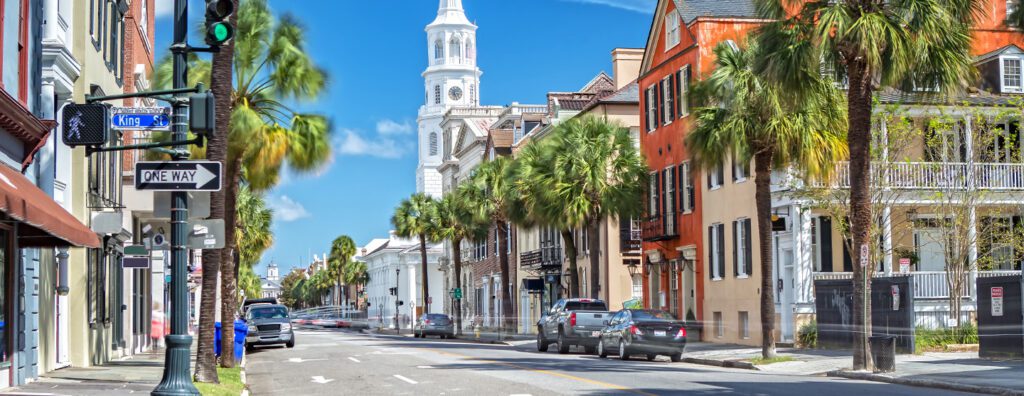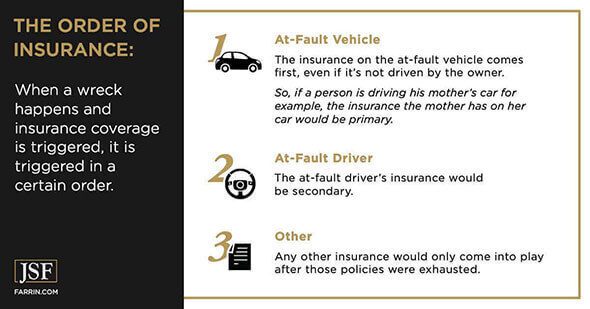
This page refers to Rideshare and Delivery Accidents in South Carolina.
Since laws differ between states, if you are located in North Carolina, please click here.
Car Accidents with Rideshare and Delivery Drivers in South Carolina: Who Takes the Hit in a Wreck?
Someone taps to summon a ride home after a night out on King Street in Charleston, or to order some food from Soby’s through their favorite delivery service app in Greenville. The driver gets the message and heads to pick up the passenger, or grab the meal and deliver it. Somewhere along the way, that driver causes a wreck. What happens next?
The question seems simple enough, but due to the nature of these rideshare and delivery apps, it’s more complex than you think. Let’s dig in.

For a free case evaluation of your particular situation, call on our award-winning attorneys at 1-866-900-7078.
South Carolina Car Insurance Complications for Rideshare and Food App Delivery Drivers
Many states have adopted rules and insurers have created new products to cover the rapidly evolving “gig” economy, which includes people who drive for rideshare and delivery apps. But in South Carolina, ordinary car insurance does not cover a driver working for a rideshare or delivery service.
If you read your car insurance policy, for example, you’re likely to find a section that deals with “livery” or “commercial use” of your vehicle. The policy generally excludes such uses from its umbrella of coverage. Drivers may be delivering food or people, but in South Carolina, the underlying principle is the same.
Livery vehicle: “A ‘livery vehicle’ remains a legal term of art in the U.S. for a vehicle for hire, such as a taxicab or chauffeured limousine, but excluding a rented vehicle driven by the renter.”
Commercial use: Transporting goods or people, or conducting a service from your vehicle, among other things.
These types of uses involve different risks to vehicle drivers and owners, and as such, their coverages will differ. This matters when a driver is not carrying the correct type of insurance for the work they’re performing. As a whole, a study by the Insurance Information Institute found that 13% of all drivers were underinsured. Given the confusion about policies and terms of service, one could safely assume that drivers working for delivery services have a higher rate of underinsurance.
All of this matters when the driver is at fault in a car accident with you. If you’re injured by that driver’s error, you should consider contacting an experienced attorney to unravel the insurance questions.
The Order of Insurance in South Carolina
In South Carolina, when a wreck happens and insurance coverage is triggered, it is triggered in a certain order. The insurance on the at-fault vehicle comes first, even if it’s not driven by the owner. So, if a person is driving his mother’s car for example, the insurance the mother has on her car would be primary. His insurance, as the driver, would be secondary. Any other insurance would only come into play after those policies were exhausted.
If the at-fault person was driving his own car when he caused the accident, then his insurance as the driver and the vehicle’s insurance are one and the same. In the examples to follow, “driver’s insurance” assumes the driver owns the vehicle being driven.
Uber and Lyft: How They Insure Their Drivers (and Passengers) in South Carolina
The first thing you need to understand about how Uber and Lyft insure their drivers in South Carolina is how they classify the different phases of the work. Both, thankfully, use a three “period” system to classify the parts of a drive, so it is relatively easy to compare them directly.
PERIOD 1: You’re offline. The driver’s own insurance policy is what’s covering them if they cause an accident. Since no coverage is coming from the service, the amount of available insurance coverage could be small. Combine this with the fact that, if the driver is relying on a personal insurance policy to cover him or her while operating as a rideshare driver, there may be no coverage at all. Most personal auto policies do not cover commercial or livery work.
PERIOD 2 – You’re online and available for a trip. Uber and Lyft begin offering coverage for their drivers during this period, but remember that the driver’s insurance policy will be the primary policy in the event of an accident. Only when those policy limits are reached can the service’s policy come into play.
PERIOD 3 – You’re en route or on a trip. The difference between periods two and three is the presence of passengers in the vehicle, which increases the number of at-risk parties in the event of an accident.
There could be many complicating factors. Contact our battle-tested South Carolina car accident attorneys if you were injured in an accident with one of these drivers and get a free case evaluation.
What Do Uber and Lyft Policies Cover in South Carolina?
Once the driver is in period two or three, Uber and Lyft offer additional coverage that can kick in after the driver’s own policy.
Uber’s Policy:
PERIOD 2 – Uber may provide additional coverage up to $50,000 per injury, with a maximum of $100,000, and up to $25,000 in property damage.
PERIOD 3 – When the Uber driver is carrying a rideshare passenger, both are generally covered under Uber’s $1 million liability insurance policy. Additionally, if a third party is injured, like another driver, pedestrian, or someone on a bicycle, they are also generally covered by Uber’s policy.
Lyft’s Policy:
PERIOD 2 – Lyft maintains third-party liability insurance for covered accidents, if your personal insurance does not apply, in the amount of at least:
- $50,000/person for bodily injury
- $100,000/accident for bodily injury
- $25,000/accident for property damage
PERIOD 3 – Lyft maintains the following insurance for covered accidents:
- At least $1,000,000 for third-party auto liability
- First party coverages, which may include uninsured motorist coverage, underinsured motorist coverage, PIP, MedPay, and/or Occupational Accident coverage
- If a driver obtains comprehensive and collision on their personal auto policy, Lyft then generally maintains contingent comprehensive & collision coverage up to the actual cash value of the car ($2,500 deductible)
Renting to Rideshare – An Insurance Loophole?
There are plenty of options available for rideshare drivers, and one that you might hear about is the idea of renting a car in order to drive it for a rideshare service. While the financial sense of this tactic may be heavily debated, it does have an effect on the insurance discussion.
In South Carolina, insurance coverage is generally included as part of the rental policy. In the event of an accident, that coverage (on the vehicle) would be primary. This may enable a driver to obtain rideshare insurance (of a sort) without involving his or her own personal policy, which would generally deny coverage due to the exclusions on commercial use.
If a Delivery Driver Is at Fault in an Accident in South Carolina, How Are the Non-Fault Parties Covered?
If you’ve been hit and/or injured in a wreck caused by a delivery driver for one of the app-based services in South Carolina, you have options. The quest for compensation begins with the at-fault vehicle’s insurance. As previously noted, this may not be much help if the driver was underinsured or did not carry the correct type of coverage for the activity in which he or she was engaged.
However, most of the different services and apps seem to offer additional coverage for their drivers, though they are not created equal, and they do differ from rideshare drivers’ coverage. The apps are updating their policy offerings and rules fairly often, so an experienced attorney may be a good way to navigate the many differences, nuances, and policies involved. Generally speaking, though, here is what you can expect in South Carolina.
DoorDash
DoorDash generally provides its drivers with a $1M contingent liability policy. However, the policy only covers drivers “in possession of goods to be delivered.” In other words, they’re covered when they’ve picked up an order to deliver it – not when they are on their way to a restaurant or leaving a delivery. Additionally, the policy can only kick in after the driver’s personal policy is exhausted.
GrubHub
Drivers for GrubHub receive no additional insurance.
Amazon Flex
Drivers for Amazon Flex generally have $1M in primary liability coverage including contingent comprehensive and collision coverage, and $1M in underinsured/uninsured motorist coverage. This policy can cover drivers as they “deliver packages, pick up packages and return undelivered packages back to a designated location.” Some of this coverage requires a driver to have certain personal insurance in order to qualify for the benefit.
Postmates
Similar to DoorDash, Postmates generally offers its drivers $1M in contingent liability coverage, except the coverage can apply from the time a driver accepts a delivery through the time the delivery is completed. Again, this can only be used once the driver’s own auto insurance coverage is exhausted.
Uber Eats
Uber X owns and operates the restaurant delivery service Uber Eats. The app offers drivers limited liability coverage of up to $1 million for accidents that occur during an active delivery. This plan does not apply in the state of New York where drivers may receive coverage of up to $100,000 for accidents that occur in between deliveries.
In order to qualify for this type of coverage, a driver must have their own comprehensive and collision insurance. Additionally, there is a $2,500 deductible a driver must meet for Uber Eats’ insurance benefits.
Can I Sue the Rideshare or Delivery Service in South Carolina?
In the case that there was some sort of corporate negligence, that would enable you to try to go after their corporate policy without relying on that of the driver. For example, if the company was negligent in its screening of drivers or allowed drivers to work more than a certain number of hours, that could be considered negligence.
Why You Need the Right Insurance if You’re a Delivery Driver in South Carolina
When you go to work for these delivery services, you’ll be handed a contract, and if you read it carefully, you’ll find out you’re probably not an employee. You’re likely an independent contractor.
As an independent contractor in South Carolina, you’re on your own in a great many ways. Foremost is that you’re using your vehicle for the purposes of the delivery service. As stated above, most personal auto insurance policies in South Carolina specifically exclude such uses for purposes of coverage.
You should contact your insurer and ask them what would be required to obtain coverage for the use you intend. The delivery service you’re working for will probably deny liability because you are not an employee unless they specifically provide coverage.
If you’re in an accident and you’re relying on your regular auto insurance coverage, your claims are likely going to be denied. Do not expect the company to validate that you have the right kind of insurance, either. That’s entirely up to you.
If I’m Delivering and I Get Injured, Can I Apply for Workers’ Compensation in South Carolina?
The answer is probably no if you’re an independent contractor. The independent contractor agreement you may sign with all of these services means you’re generally self-employed.
What if I’m Driving for a Delivery Service and I’m Injured by Someone Else in South Carolina?
Then you may go after that person’s insurance. It likely will not matter to your insurer at that point, depending on the insurance rules of your state. In South Carolina, the at-fault driver’s insurance should be the one who pays, with additional possible liability for uninsured and underinsured drivers kicking in as necessary.
Bottom Line: Do I Want an Attorney if I’m Injured by a Rideshare or Delivery Driver in South Carolina?
Yes. Here’s why:
If you’re injured by one of these drivers, there might be more insurance available than the driver’s policy, but it can be a confusing process to try and figure out. The insurance company adjuster may be friendly and professional, but their interests are not the same as yours. Your attorney is on your side and has the knowledge to go head to head with the adjuster on your behalf.
You should also be aware that there is data available on the driver’s app that might show how long the driver has been driving (in case fatigue was the cause of the wreck), GPS, speed, along with other pertinent data. An experienced personal injury attorney will know how to seek and try to preserve such evidence. Let us navigate the maze of insurance on your behalf.
The Formidable Team of South Carolina Car Accident Attorneys at James Scott Farrin
We have recovered more than $2 billion in gross compensation for more than 73,000 clients since 1997. And those numbers don’t include the $1.25 billion we helped recover against the U.S. government for 15,700 claimants in a historic class action case.1,3
We follow a “You-First” policy where we put your best interests first in all our decisions on your behalf. Our goal is always to help you get the full compensation you may deserve as quickly as possible.
We also work on a contingency fee, meaning we don’t collect an attorney’s fee at all unless we recover compensation for you. Guaranteed.2
For a free case evaluation, call 1-866-900-7078 any time.


